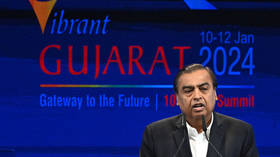Indian opposition leader embarks on 6,700km trek ahead of key polls
The leader of India’s main opposition party, the Congress, has embarked on a mammoth nationwide journey as part of efforts to challenge Indian Prime Minister Narendra Modi’s ruling Bharatiya Janata Party (BJP) in the general election scheduled for May.
Rahul Gandhi began his second march in two years on Sunday, setting out in the conflict-ridden northeastern state of Manipur. On Monday, Gandhi’s ‘Bharat Jodo Nyay Yatra’ (loosely translated as ‘Unite India Justice March’) reached the district of Senapati in Manipur before heading to fellow northeast state Nagaland. Gandhi is traveling in a custom-made bus and is also walking part of the distance to interact with people lined up along the route, the Times of India reported.
The Congress leader’s second political pilgrimage will cover 6,200km from the east of the country to the west, crossing 15 states including Assam, West Bengal, Bihar, Chhattisgarh, Uttar Pradesh, Madhya Pradesh, and Gujarat. It is Gandhi’s second ‘yatra’, following his five-month foot march across the country between September 2022 and January 2023. During the first campaign, he covered almost 4,000km from Kanyakumari, India’s southernmost point, to Jammu and Kashmir, the northernmost territory bordering Pakistan.
RaGa Prays for Divine Inspiration As Yatra Begins in #ManipurThe Congress leader lost his South Mumbai MP Milind Deora earlier Sunday and faces questions from within the INC as he begins a 6,700km journey over the next 67 days. pic.twitter.com/GzYenZlaV3
— RT_India (@RT_India_news) January 14, 2024
Manipur was chosen as the starting point by Gandhi this time around, given the intense conflict that has unfolded in the state since May as the two main communities, the Kukis and Meiteis, have clashed over special privileges provided by the government. The death toll in the fighting has passed 180 while tens of thousands of people have been displaced.
Gandhi’s ‘yatra’ comes in the aftermath of several defeats suffered by the Congress in state legislative elections in November, and is aimed at revitalizing party morale.
On the very first day of the pilgrimage, however, the Congress suffered a setback when one of its principal leaders, former minister for communications and shipping Milind Deora, resigned from the party. Deora has defected to the Shiv Sena, a right-wing regional party in Maharashtra, led by the chief minister of the state, Eknath Shinde.
“I have tendered my resignation from the primary membership of Congress, ending my family’s 55-year relationship with the party,” Deora said in a post on X (formerly Twitter). Hitting out at India’s oldest party, which he joined in 2004, the politician suggested that “the same party that ushered in economic reforms 30 years ago, is a party that is abusing industrialists, businessmen and calling businessmen ‘anti-nationals’.”
In 2023, opposition factions led by the Congress formed a 28-party alliance named INDIA (Indian National Developmental Inclusive Alliance) to collectively oppose the BJP in national elections. However, internal disagreements over fielding a unified candidate against the ruling party have plagued the alliance.
Where India Meets Russia – We are now on WhatsApp! Follow and share RT India in English and in Hindi













